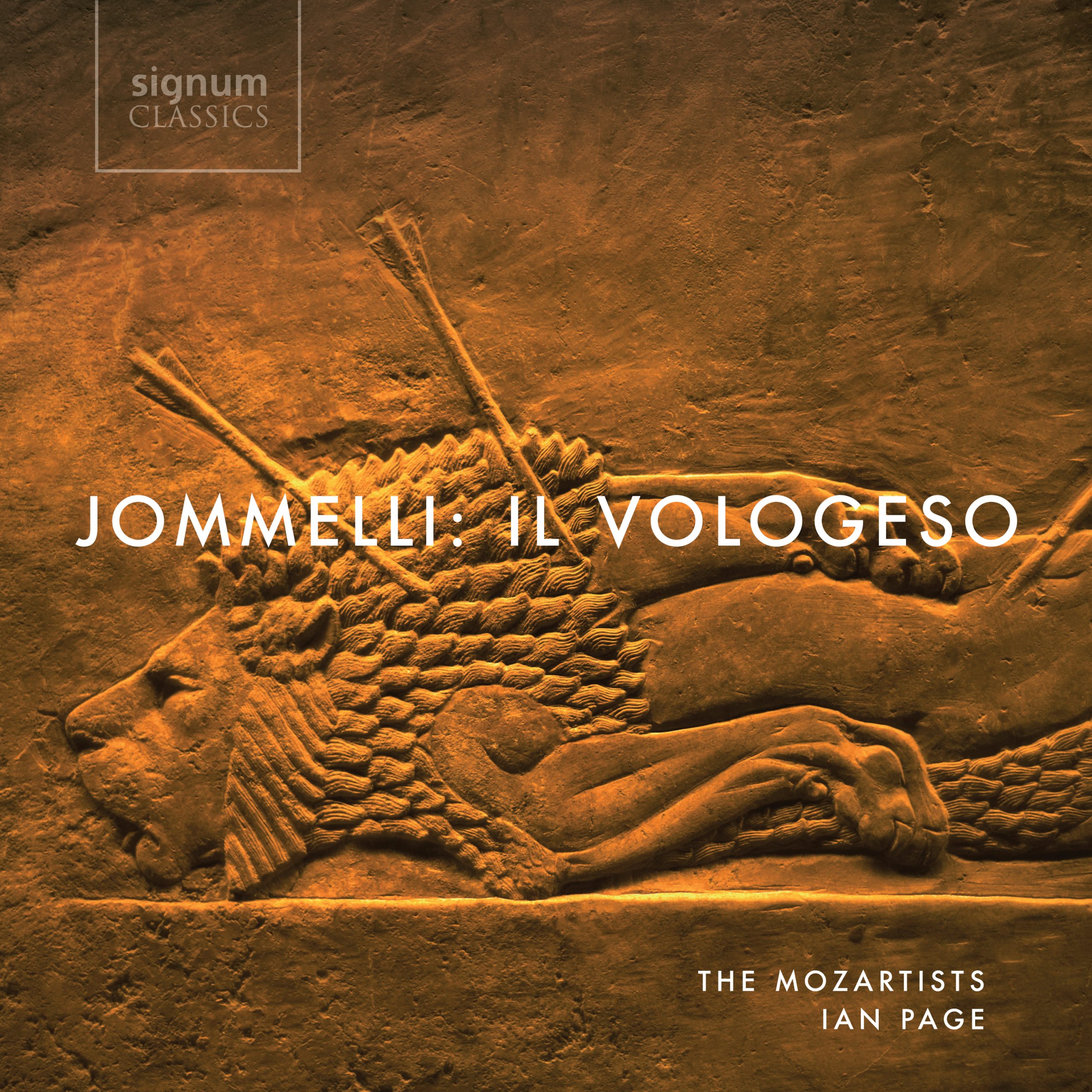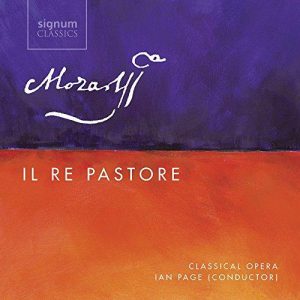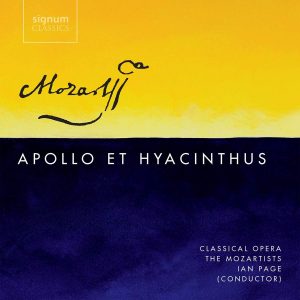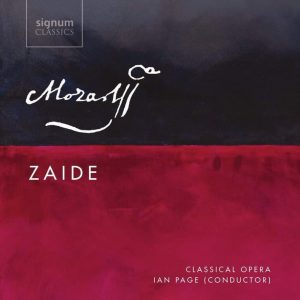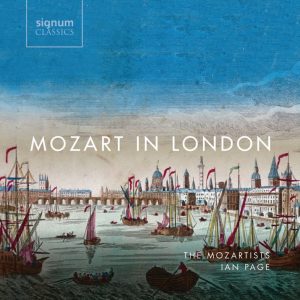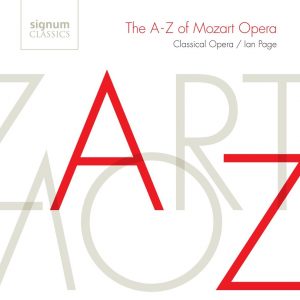“Every aspect of this totally pleasurable evening, a bracing halfway house between Handel and Mozart, confirmed that everything The Mozartists put on will be worth seeking out. Microphones suggested a recording in the offing; if so, I’d snap it up straight away.”
★★★★★ THE ARTS DESK
The Mozartists’ live recording of the UK premiére of Niccolò Jommelli’s Il Vologeso, first performed on 11 February 1766 for the Stuttgart court in Ludwigsburg, is now available on Signum Records. For this one-off concert performance at London’s Cadogan Hall The Mozartists assembled a superb young cast, including mezzo-sopranos Rachel Kelly and Angela Simkin – both graduates of the Royal Opera’s Jette Parker Young Artist Programme – and soprano Gemma Summerfield and tenor Stuart Jackson, both Associate Artists of The Mozartists. Jommelli was one of the most celebrated composers of his day, writing 80 operas and a large number of sacred works. This performance was part of The Mozartists’ acclaimed MOZART 250 project, a chronological 27-year project exploring the life, works and influences of Mozart, starting from the year in which he composed his first symphony in London and projected to end with his final Requiem.
Il Vologeso sets an adaptation by Mattia Verazi of the libretto of the same name by Apostolo Zeno, based on the story of the Parthian King Vologases IV, and marks Jommelli out as a highly original and accomplished voice.
The opera is set in Ephesus, on the western extremes of the Parthian Empire, in c.164 AD. For the past three years Rome has been jointly ruled by two Emperors – Marco Aurelio and Lucio Vero. While Aurelio, the more senior and popular partner, remains in Rome, Vero has been leading the Roman army in their ongoing war against the advancing Parthians, whose king, Vologeso IV, has been defeated and – so everyone believes – killed. Following this victory Vero was expected to return to Rome, where he is due to marry Marco Aurelio’s daughter Lucilla. Instead, though, he has remained in Ephesus, keeping watch over the Parthian military threat and amorously pursuing Vologeso’s bride, Berenice.
Act One
Berenice continues to repel Lucio Vero’s unwelcome and inappropriate advances. At a banquet in Vero’s palace, a Parthian slave offers the Emperor a goblet of wine. Berenice immediately recognises the slave as her beloved Vologeso, who suddenly intercedes when Vero passes the drink to her; he prevents her from drinking it and admits that it was poisoned and intended for the Emperor, but only Berenice recognises her beloved’s true identity. He audaciously proclaims his defiance against the Romans (Aria, “Invan minacci”) before he is led off to be imprisoned. Vero turns his attentions back to Berenice, but is immediately thwarted when his attendant Aniceto interrupts with news that the Emperor’s fiancée Lucilla is arriving in Ephesus, along with Marco Aurelio’s ambassador, Flavio. Vero resolves to deflect their arrival by arranging some public games, and continues his attempts to conquer Berenice’s heart (Aria, “Luci belle”). Left alone, Berenice rejoices that Vologeso is still alive (Aria, “Se vive il mio bene”).
Lucilla and Flavio arrive in the town square. Lucilla is anxious and saddened that the Emperor has not arranged for them to be met, but he soon arrives. He briefly defends his behaviour before departing to organise the sporting festivities. Lucilla is convinced that Vero is incapable of betraying her (Aria, “Tutti di speme al core”), but Flavio is not surprised by her misguided optimism, for a faithful heart does not think to distrust anyone else (Aria, “Crede sol che a nuovi ardori”).The scene changes to the public arena where the festive games are to take place. Vero explains to Berenice that this is where criminals are thrown to the lions, and a fanfare announces the start of proceedings. Vologeso is led into the arena, and castigates Berenice for faithlessly colluding in his death. Inadvertently calling him by his real name, she renounces his accusations by jumping into the arena beside him, and before Vero can prevent it the gates are opened to let the lion in. The Emperor is forced either to expose his love for Berenice or to watch her die. He throws his sword to Vologeso and implores him to kill the lion with it. Lucilla realises that the rumours are indeed true, and that she has been betrayed by Vero. Having slain the lion, Vologeso nobly returns Vero’s sword and gives himself up; now that Berenice has shown herself to be faithful he can happily face execution. Vero is urged to repay and return Lucilla’s devotion and to release the captive Parthians, but he remains silent (Quartet, “Quel silenzio?”).
Act Two
Lucio Vero has summoned Vologeso, and now asks Aniceto to instruct Lucilla to return to Rome. Aniceto is grateful to be entrusted with the task, particularly as he himself has romantic designs on Lucilla, and assures Vero that he can rely on him (Aria, “So ben comprenderti”). Vero now offers Vologeso his freedom and his return to the Parthian throne if he will give up Berenice, but when Vologeso refuses he furiously sends him back to his cell to await sentence (Aria, “Sei tra’ ceppi”). When Berenice discovers Vologeso still in chains she offers to plead on his behalf to Vero, but Vologeso asserts that this would be to betray him, and assures her that he will die happily and at peace if she continues to scorn and reject the Emperor (Aria, “Cara, deh serbami”).Berenice is now summoned by Vero, who tells her that she must choose between his hand in marriage or Vologeso’s head. Desperate, she tells him that if he demands her heart she will give it to him (Aria, “Tu chiedi il mio core”). Close at last to fulfilling his desires, Vero can feel no satisfaction at the prospect if Berenice continues to hate him (Cavatina, “Che farò?”). Meanwhile, Lucilla tells Flavio that Vero has demanded that they return to Rome straightaway. She insists on hearing it from the Emperor’s own lips, though, and confronts him. Vero admits unequivocally that he is in love with Berenice, but when Lucilla absolves him he suggests that she too might not be faithful. Lucilla is furious at such an unfounded allegation, and resolves to leave (Aria, “Partirò, se vuoi così”). Vero then informs Vologeso that Berenice has secured his life and freedom by offering Vero her heart; Berenice confirms that this is what they agreed, but informs the Emperor that to gain her heart he will have to rip it from her breast. Vero is livid and puts her in chains, but Berenice and Vologeso remain fearless and steadfast (Trio, “Se fida m’adora”).
Act Three
Flavio informs Lucilla that the Roman troops are poised to help him thwart Vero and reinstate Vologeso on the Parthian throne. Lucilla bids farewell to the Emperor, who wishes her a safe journey and then laments the anguish that Berenice causes him (Aria, “Uscir vorrei d’affanno”). Lucilla is heartbroken. Flavio and Roman soldiers break into Vologeso’s cell and help him to escape. Meanwhile Aniceto has supervised Vero’s final attempt to win Berenice. He stages a ghostly, macabre dumb show, at the height of which Berenice is presented with a covered object, supposedly Vologeso’s severed head (Aria, “Ombra, che pallida fai”). Even then she rejects Lucio’s advances, and as she readies herself to join her beloved in death, Vologeso himself storms in with Flavio and Roman officers. Vero must either die or restore Vologeso and Berenice to their kingdom, return to Rome and marry Lucilla; he chooses the latter option. Everyone is finally happy, except perhaps for Aniceto, who must now abandon his own feelings for Lucilla (Finale, “Al mare invitto”).
LUCIO VERO — Stuart Jackson (tenor)
VOLOGESO — Rachel Kelly (mezzo-soprano)
BERENICE — Gemma Summerfield (soprano)
LUCILLA — Angela Simkin (mezzo-soprano)
FLAVIO — Jennifer France (soprano)
ANICETO — Tom Verney (countertenor)

